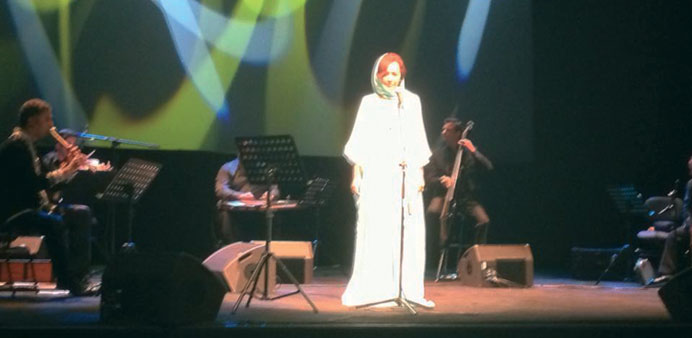By Salman Siddiqui/Staff Reporter
It is strange that the West is interested more in Arab religious music than any of the record label companies in the Middle East, a popular Moroccan vocalist says.
Karima Skalli, who is often labeled as one of the most important religious stanzas vocalists in the Arabic Maghreb, recently gave a performance at Katara to a packed audience.
Accompanied with her band that included an exceptional Qanun player, violist, flute player and a percussionist, she left the crowd mesmerised with her amazing rendition of religious songs.
In an interview with Gulf Times, she said that Qatar through Katara was playing a great role in promoting the rich tradition of Arabic music devoted to the praise of Allah, his Prophet Muhammad (pbuh) and his companions.
She praised Katara for regularly arranging music workshops and concerts.
“Doha has fabulous cultural activities and it’s always exciting to be a part of its festivals. Also, equipment and facilities at Katara are world-class and it’s a joy as an artist to perform here,” she said.
In her decades-long career, she found that the Western companies and universities were more interested in Arab religious music than companies back home.
“I hope our countries (in the Middle East) do more to promote such music,” she said.
Born in Casablanca, Karima began singing traditional Arab music at a very young age. She studied classical Arabic singing at the Marrakesh Conservatory and after graduating won a national award of excellence in Arab singing.
“But after some years, I found out that my true voice and tune was in singing Sufi music,” she said.
Sufi music is devotional music inspired by the works of poets such as Rumi, Hafiz, Bulleh Shah and Khwaja Ghulam Farid. In South Asia, the Sufi music tradition is called Qawwali, which too is devoted to the love of God, prophet and his companions.
However, Skalli informed that the Sufi orders and music were also common in Morocco.
In fact, according to her, early music in the Middle East had traditional religious songs that spread from Syria and Iraq to the rest of the world.
About the role such music plays in a society, she said: “Creativity (in Sufi music) is a religious moment with God and music plays a very important role in finding the right path towards God.”
Ramadan is a time of not only fasting and prayer for Muslims, but also an opportunity to connect with people from all around the world. And if there is one common language that has the power to connect everyone, it is music.
Skalli said: “Music is the language of love and peace. It is the greatest and simple language to promote peaceful dialogue.”
She said that her aim was not to be popular as a pop artist. “I’m just seeking a moment to share with other people.”
Skalli has collaborated with acclaimed Moroccan oud player and composer Said Chrabi and Iraqi oud virtuoso Naseer Chama on many occasions and worked with Lebanese composer/musician Marcel Khalife to present a concert in honour of poet
Mahmoud Darwish.
This was Skalli’s third performance in Doha. She has performed the world over, including in Paris and the US. Her album Wasla is credited with successfully reviving the Wasla form of music.

Karima Skalli performing at Katara.
